Clark recognizes commitment to DEI work
Clark University has announced the recipients of the third annual President’s Achievement Awards for Inclusive Excellence, which recognize people, units, or programs that contribute to the advancement of inclusive excellence at the University and in the Worcester community.
Each award includes a gift of $1,500 for the awardee to designate toward a program or department of their choice, supporting Clark’s shared commitment to equity, inclusion, and diversity.
The Distinguished Inclusive Excellence Award, which includes a $1,000 gift, also was announced.
Undergraduate and graduate students, academic and staff employees, student organizations, campus offices, departments, centers, academic or administrative programs, and Clark partnerships within the broader Worcester community, can be nominated.
This year’s awardees are Loobna Zahan ’22, Christopher Munoz Calene, Kadijha Kuanda ’22, Kaila Skeet Browning ’22, Esteban Veloso Cardemil, Shay Hopley Malko ’14, and the Mosakowski Institute for Public Enterprise, and Nadia Ward, who earned the Distinguished Inclusive Excellence.
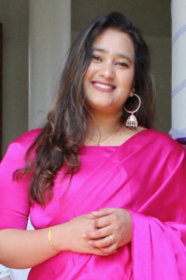
Loobna Zahan
When Loobna Zahan ’22 arrived at Clark, she didn’t know what to expect. The first-generation student didn’t see herself as a leader or change-maker. In four years, that changed.
“Clark communities helped me embrace my ethnic and religious identities and helped me realize how important it is to use our voice to advocate and fight for those who need the resources the most,” Zahan says. “One thing I have learned is if you do not use your voice, no one sees you, no one looks for you.”
Zahan was a leader in the South Asian Student Association and the Muslim Students’ Association, was an Advancing Clark Excellence mentor for the Multicultural and First-Generation Student Support Office (now Identity, Student Engagement, and Access) for the 2021-2022 academic year, and choreographed the Bangladesh dance for Gala in the spring. She majored in psychology with a minor in management.
“When I was doing the stressful, exhausting work behind the scenes, which often felt lonely and not recognized, I did not anticipate being acknowledged for my work,” she says. “I am extremely grateful for this award, and I only hope future leaders in my communities are also appreciated, recognized, and celebrated for the contributions they make to support and fight for their communities.”
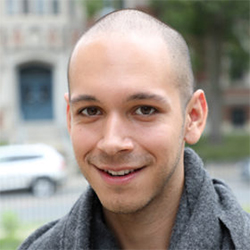
Christopher Muñoz-Calene
Christopher Muñoz-Calene says his experience applying to college led him to his role as associate director of access partnerships at Clark. As an applicant, Muñoz-Calene wanted to learn more about resources for students of color and those in the LGBTQIA+ community, but didn’t know where to look.
“It never occurred to me that admissions offices could be resources in learning about an institution,” he says. “That experience informs my approach to my work at Clark. My guiding question is: How do we demystify the process and empower all students to access information as they make their college choice?”
Muñoz-Calene strives to create bridges for prospective students to connect meaningfully with Clark’s campus.
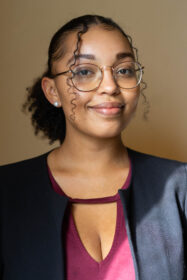
Kadijha Kuanda
For Kadijha Kuanda, becoming an advocate for the BIPOC community was a necessity, not a choice.
“Although I am grateful to have been given the opportunity to do this work alongside incredible and hardworking people including students, professors, and faculty, there will always be more to be done to create the safe, just, and equitable space all of us deserve and need,” Kuanda says. “It has been with great joy that I have seen both international students and BIPOC students come together during and beyond the pandemic to support each other and celebrate our identities.”
Kuanda got involved with the Black Student Union during her sophomore year and served as its president during her last semester at Clark. She was also a founding member of the BSUxCUSC coalition to advocate for racial justice on campus and for all BIPOC students. She majored in political science with a minor in philosophy and a concentration in ethics and public policy.
Kuanda says her award is for international and BIPOC students who have prevailed through difficult times.
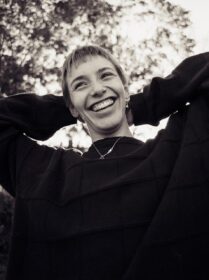
Kaila Skeet Browning
At Clark, Kaila Skeet Browning learned that equity work is more than just meeting with University administration. It also means establishing connections across campus.
“The root of social change at Clark has always been because of the work of marginalized students of color, especially Black people of marginalized genders,” she says. “We have supported each other through sharing rides and meals, countless late-night phone calls, and bringing humor and joy into this work whenever possible.”
Skeet Browning says it took brilliant minds to sustain initiatives such as the FIRM Food Pantry, affinity housing, and disability affinity space, and thanked friends, co-organizers, and mentors who were instrumental in her growth as a person and organizer.
“I do not doubt there will be continued commitment and love that current and upcoming organizers will pour into these initiatives, as well as the new initiatives they’ll create,” says Skeet Browning, a former community, youth, education studies major.
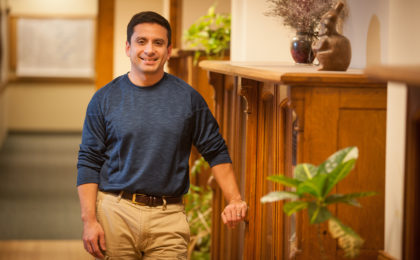
Esteban Veloso Cardemil
Professor Esteban Veloso Cardemil’s research focuses on understanding and addressing mental healthcare disparities in the United States that disproportionately affect individuals from low-income and racial/ethnic minority backgrounds. He’s taught related courses, including Race and Racism, and just completed a three-year term as chair of the Psychology Department. As chair, Cardemil worked to prioritize DEI considerations into curriculum, teaching practices, and research.
“My interest in this work stems, in part, from my identity as a cisgender, heterosexual, able-bodied Latino man who immigrated to the U.S. from Chile and grew up in a bilingual and bicultural household,” he says. “Navigating the challenges and opportunities that come from living as a person of color in the U.S. with numerous identity-based privileges shaped my sense of self and my view of the relationship between the personal and the professional.”
Cardemil says the Clark community’s passion to improve the world is inspiring.
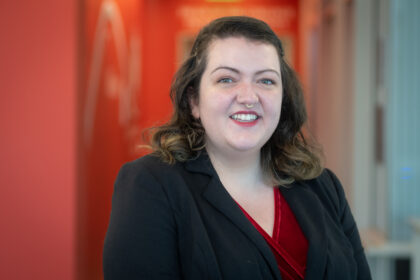
Shay Hopley Malko
Shay Hopley Malko wants to hear your story. She’s a passionate listener intent on learning about other people’s experiences and identities.
“I am always questioning whose story gets told, as well as the stories we tell ourselves about difference and privilege. Stories are my entry into diversity, inclusion, and social justice work, especially as a white, cisgender woman,” she says. “I work to build strong relationships so we can authentically talk about difficult issues like race, sexuality, ability, and systemic oppression.”
As a Clark student, Hopley Malko was involved in Residential Life and Housing, the Undergraduate Student Council, the knitting club, and the English Department. After working at North Dakota State University, Western Connecticut State University, Trinity College, and the University of Connecticut, she returned to Clark in 2020 as the University’s academic success manager.
“I have been so lucky to have mentors and colleagues who show me daily the radical power of practicing empathy and showing up to listen to and engage with folks who do not feel heard or affirmed in our communities,” she says. “It is an honor to hear people’s stories.”
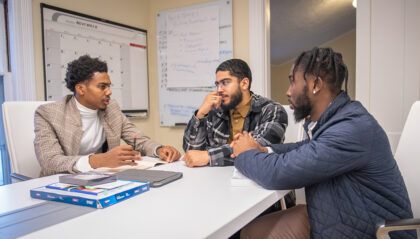
Mosakowski Institute for Public Enterprise
Clark’s Mosakowski Institute for Public Enterprise focuses on the behavioral health of adolescents and young adults, particularly young men of color, and imagines a world where all young people are supported in developing the social and emotional skills necessary to be successful.
According to the Institute: “Addressing the behavioral health concerns of youth requires a response that espouses the very values we hold dear and makes us who we are; we are a community that cares. Our approach to this important work is guided by our core values.
“We culturally situate our work at the intersection of culture, context, and place in a way that appreciates and values diversity and inclusion of all people. And importantly, our work with adolescents and emerging adults is conceptualized within a strengths-based model that emphasizes youth empowerment, assets and opportunities, not deficits.”
The Institute’s mission is to leverage digital health technologies to reimagine behavioral health as young people in America face staggering rates of mental health challenges. It is pioneering an app called MI PEACE that allows adolescents and young adults to learn about common behavioral health concerns, assess their symptoms, and determine a course of action.
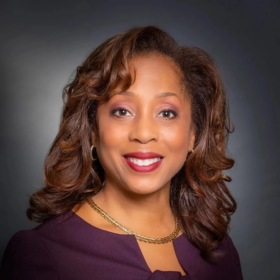
Nadia Ward
Nadia Ward believes Clark’s motto, “Challenge Convention. Change Our World.” applies perfectly to the goal of the Mosakowski Institute for Public Enterprise, where she serves as executive director.
“I think the mental health crisis among young people in this country is a problem worth solving,” she says. “It will require our collective energy, resources, and top talent to do so.”
Ward and the Mosakowski Institute create new ways to leverage state-of-the-art digital health technologies to develop, market, and scale behavioral health interventions that will assist teachers, counselors, and behavioral health practitioners in their work with youth and families. Ward is a professor of practice and licensed psychologist with more than 25 years of experience in school-based mental health, social-emotional learning, substance abuse prevention, urban education reform, structural racism, and educational policy.
“There are many things I love about Clark, chief among them is the spirit of collaboration that exists here. From our trustees and the senior leadership team, to the faculty, staff, and our amazing students, you have all created ‘the village’ that I needed to create a vision for the Institute that addresses the behavioral health needs of youth in bold new ways,” Ward says. “We are developing digital health technologies that will fundamentally redefine how behavioral health services are delivered to youth in this country and abroad.”
Members of the Clark community also nominated this year for President’s Achievement Awards for Inclusive Excellence were: Krithika Arunthuthiyar, M.S. ’22, Ramon Borges-Mendez, Lamara Burgess, Emily Cai ’22, Elicia Cousins, Oliver McCormick ’24, Vaishali Menon, MPA ‘22, Arundhati Nag, Venkat Teja Peram, MSIT ’22, Donald Spratt, Jason Trinklein, and Alex Yasan ’22.


